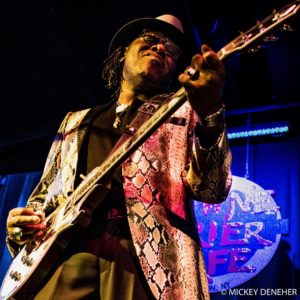
“I was sort of ordained to play music.”
So says blues singer-guitarist Joe Louis Walker, who’ll be performing at the Payomet Performing Arts Center in Truro on Saturday, Oct. 19, as part of OysterFest weekend. A member of the Blues Hall of Fame and four-time Blues Music Award winner, Walker was born and raised in San Francisco, the son of Southern-born parents who shared with him their love for the blues.
“When I was six, seven years old, my dad used to come home from working construction, and he’d sit down and have a big bowl of cornbread and buttermilk and spin his 45 records. A lot of those old guys [on the records] were guys he had seen in juke joints in Mississippi — Sonny Boy Williamson and people like that. And once I heard the music, I liked it,” Walker says. “My brothers and sisters did, too, but he’d seen that I really liked it, so he would let me listen with him and, as I got a little bit older, explain things — ‘This is so and so’; ‘This is how this goes’; ‘This is country blues.’ My dad liked piano players, so he really turned me on to Meade Lux Lewis, Pete Johnson, all those guys.”
Walker’s mother also had a hand in encouraging his musical development. “She loved B.B. King, and being from Arkansas, she liked people who came from there — Jimmy McCracklin, people like that,” Walker says.
And when his cousins, who had a working band of their own, wouldn’t let the young Joe Louis play with them, his mother came up with a solution. “They wouldn’t let me play, because I wasn’t very good when I was 11, 12,” Walker says. “So, my mom said, ‘I’ll make you a deal: All your friends, they go to play football on Saturday afternoon. If you want to give up that time and take music lessons, I’ll pay for them. And if you get good enough, I’ll buy you a guitar, and you can play with your cousins.’ That was all she had to tell me. I don’t think I ever dribbled a basketball or threw a football after that.”
Walker drew further inspiration from his neighborhood, San Francisco’s Fillmore district. It’s best known, perhaps, as the incubator for the ’60s rock revolution, but before that, when Walker was still a boy, it was already a culturally rich place. “That was when the Fillmore district was like Harlem in the ’30s,” Walker says. “It was definitely a fertile area. When Charles Sullivan owned the Fillmore auditorium, before the hippies came, that was like the Apollo theater of the San Francisco area.”
By the time he was 14, Walker was a card-carrying member of the local musicians’ union and was soon playing in clubs around the region. That’s when he would encounter many blues greats on tour. “When the blues guys would come to town, they’d hire me to get stuff, show them around and what have you. That’s how I got to play with Fred McDowell and got to know Magic Slim. I played a lot with Earl Hooker, John Lee Hooker,” Walker says.
Leaving home at 16, Walker remained in the Fillmore area, where he fell in with the newly arriving hippies. His musical circle now included young rock and blues performers such as Jimi Hendrix, Buddy Miles, and a guitarist from Chicago named Michael Bloomfield, then on the cusp of rock stardom. “I can’t say enough about Michael. He was like a big brother to me. He took me in when I didn’t have anywhere to go at the time. He helped me. He introduced me to so many people,” Walker says.
“It was a good experience for the most part,” Walker says, expressing regret that those long-ago friends died well before their time. “I really wish that all those guys would have been able to stick it out and they’d all be here. I wish Buddy was still here. I wish Jimi was still here. I really wish Michael was still here, because they were so important in terms of being artists and sticking with your art, as opposed to being a Facebook-YouTube musician and worrying about getting 100,000 hits. It’s not about that. Our generation wasn’t like that. It was all about the art and the music.”
By 1975, Walker was burnt out on the blues. He turned to gospel, playing for 10 years with the Spiritual Corinthians, before reintroducing himself to the blues world in 1986 with his debut album, “Cold Is the Night.” He has since recorded 25 more albums, including his most recent, “Viva Las Vegas,” a live recording. All have a blend of blues, soul, gospel, and rock, something that Walker sees as a natural amalgamation.
“Blues and gospel are pretty much brother and sister, brother and brother, whatever you want to say. Soul music is definitely out of gospel, because there isn’t any difference between Southern soul and gospel singing — it’s the same thing,” Walker says. “All three are connected, and you can’t leave out rock ’n’ roll, because rock ’n’ roll is, as Muddy [Waters] said, ‘the baby of the blues.’ ”



